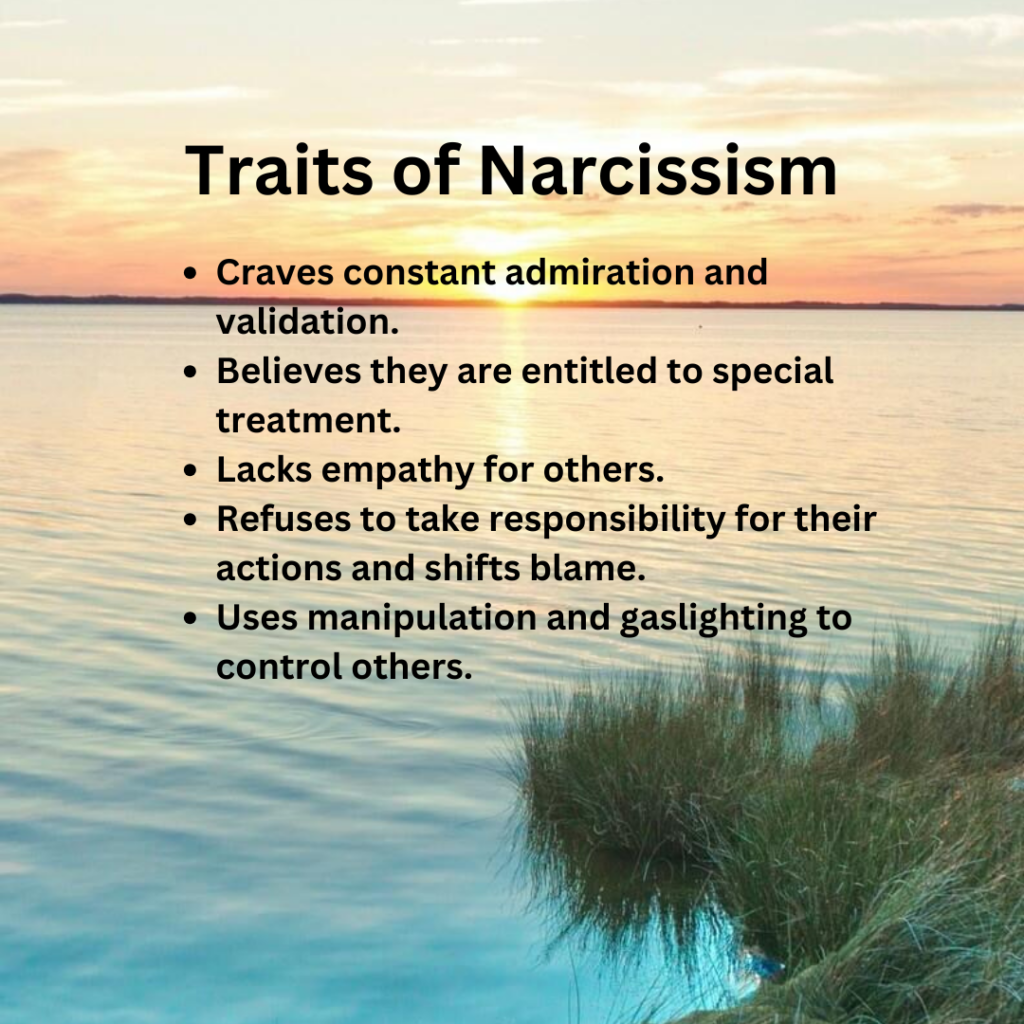Am I a narcissist? It’s a question many people find themselves asking, especially as awareness of narcissistic behavior grows. If you’ve ever thought, ‘Am I a narcissist?’ you’re not alone in this self-reflection. If you’ve ever wondered, “Am I the problem?” or thought, “What if I’m the narcissist?” you’re not alone. With terms like “narcissist,” “gaslighting,” and “emotional abuse” becoming part of everyday conversations, it’s natural to feel concerned about whether we might be the ones responsible for the toxicity in our relationships.
I understand this fear because I’ve lived it. For years, I was told I was “too sensitive,” that I was overreacting, and that the problems in my relationship were my fault. At one point, I even began to ask myself, “What if I’m the narcissist?” I had been so conditioned to believe that I was the issue. I questioned everything—my feelings, reactions, and behavior.
But here’s the thing: if you’re asking yourself these questions, it’s a good sign you’re not a narcissist. Narcissists rarely reflect on their behavior. They tend to believe that everyone else is the problem.
Let’s dive into why asking yourself, “What if I’m the narcissist?” is a sign that you aren’t—and how I came to understand this through my own experience.
Am I a Narcissist? Why Narcissists Don’t Ask Themselves This Question
Narcissists rarely stop to wonder if they’re the problem. Narcissism is defined by a lack of empathy, a need for control, and an inflated sense of self. Narcissists either view themselves as superior or as victims—either way, they never see themselves as the cause of an issue. Why question yourself when, in your mind, you’re always right?
In my own experience, my ex never once stopped to ask himself, ‘Am I a narcissist?’ Instead, he always blamed others. If we argued, it was always twisted to be my fault. If I expressed hurt, I was “too sensitive” or “overreacting.” Narcissists have a way of turning everything around so they come out as the victim and you as the problem.
I walked away from so many arguments feeling confused, doubting my own reality—Had I really been overreacting? Was I too emotional? This kind of manipulation, known as gaslighting, is a key way narcissists maintain control.
Narcissists also thrive on creating chaos. They stir up conflict to keep people off-balance, reinforcing the idea that others are always at fault. I can’t count the number of times I apologized for things I hadn’t done just to keep the peace. My ex, on the other hand, never apologized or admitted any wrongdoing because, in his mind, he wasn’t wrong.
This is why narcissists don’t ask themselves, “Am I the narcissist?” Their worldview is built on the belief that they are either better than others or unfairly treated. Self-reflection would unravel that carefully constructed reality.
Why Asking “Am I a Narcissist?” Shows You’re Not One
If you’re genuinely concerned and asking, ‘Am I a narcissist?’ that’s a sign of self-awareness.—a trait narcissists fundamentally lack. Narcissists don’t reflect on how their behavior affects others. They believe their actions are always justified and their feelings matter most. But when you ask yourself, “Am I the problem?” you’re engaging in a level of introspection that narcissists can’t reach.
Your questioning shows empathy and concern—two traits absent in narcissistic behavior. Narcissists care more about how others affect them, not the other way around. They focus on maintaining control, admiration, or power, rather than taking accountability.
I remember constantly asking myself if I was too demanding or emotional. Later, I realized these were signs of introspection—something narcissists don’t do. Narcissists deflect responsibility onto others and avoid self-examination.
Asking if you’re a narcissist isn’t just about self-awareness—it’s about humility. You’re willing to look at yourself critically, showing a desire for personal growth. Narcissists resist change because it threatens the perfect image they’ve created of themselves.
Your questioning is a form of emotional intelligence. It shows that you’re capable of self-reflection, something that leads to healthier relationships and personal accountability—traits narcissists lack because they avoid vulnerability. If you’re asking, “Am I the narcissist?” know that the very act of asking puts you far from fitting the profile.
My Experience with Narcissistic Behavior
I’ll never forget the moment I realized I wasn’t the problem. For years, I was told I was overreacting, “too sensitive,” and that all the issues in our relationship were my fault. I questioned myself constantly, trying to fix what I thought was wrong with me. I convinced myself that if I just changed—became more understanding or less emotional—things would improve.
It wasn’t until I saw an amazing therapist that things shifted. During one session, as I described my relationship, she gently introduced the idea that my partner might be a narcissist. I hadn’t considered it before—it seemed like something that happened to other people.
But as she explained traits like manipulation, gaslighting, blame-shifting, and a lack of empathy, everything clicked. My constant feeling of walking on eggshells, the way my ex twisted situations to make me the villain, the erosion of my confidence—it all pointed to narcissistic abuse.
It was freeing but heartbreaking. It was freeing because I had a name for what I was going through, but it was heartbreaking to realize how deeply the manipulation had gone and how long I had believed I was the problem.

Common Traits of Narcissism
Narcissism involves long-term patterns where the individual:
• Craves constant admiration and validation.
• Believes they are entitled to special treatment.
• Lacks empathy for others.
• Refuses to take responsibility for their actions and shifts blame.
• Uses manipulation and gaslighting to control others.
For me, this manifested in subtle put-downs, twisted situations, and making me feel like I wasn’t good enough. My concerns were minimized, or worse, turned into something I was blamed for.
What to Do If You’re Still Worried
We all have moments where we act selfishly. That’s part of being human. But narcissism isn’t about occasional selfishness—it’s about a long-term pattern of harmful behavior.
If you’re worried about whether you might be the problem, it’s likely because you care about others, which narcissists don’t. The fact that you’re asking shows self-reflection and a willingness to change—something narcissists avoid.
If you’re still uncertain, seeking therapy can help you gain clarity. For me, having someone validate my experiences was life-changing. It helped me rebuild my confidence and trust my instincts again.
Final Thoughts: You Are Not Alone
If you’ve found yourself wondering, “What if I’m the narcissist?” take comfort in knowing that self-awareness and empathy are signs that you’re not. Narcissism thrives on a lack of reflection and accountability. By asking this question, you’re already doing the work narcissists won’t do.
Trust yourself. Keep reflecting, growing, and remember—you are not alone in this journey.



Still AFTER 37 years I started to think, Yes, MAYBE I was/AM the problem!!!!!!! Now that the kids are all grown, and I am old, too much time to think, when NO one else even cares to discuss the issues with me. They have all moved on, and here I am at the age of almost 76, asking myself, why I CANNOT MOVE on, so depressed, still trying to figure everything out! And I had so many ANGELS supporting me, I just can’t stand myself for feeling this way. I should be happy, and yet, after ALL THESE YEARS, I am thinking, WOW, I tried to save everyone, BUT MYSELF?????????? CONFUSED and so SO ALONE! 86 TO 97 Rich parents of the SEXUAL ABUSER, who could no LONGER GET TO ME, got to our baby girl still in diapers. NO, NO, NO, not made up. Saved her, but 10 years tore my family apart!!! Grandparents had MONEY, MONEY, and connections, the CHRISTAINS, saving the world! Go figure, never got the baby, again, so, SO, MANY ANGELS, and WHY am I feeling this anger so many years later???????????????
I’ve just recently found myself being a Drama Queen and Obsessive Narcissist… and it’s crazy…not for me personally but I do bother lots of people with my emotional roller coaster, public drama and never ending manipulations of being victim of love…
Very true
Im a covert narcissist. I yell at anyone who hold me accountable for my toxic behavior
Im self absorbed and set up my children for failure in emotions and in life.
I have a secret girlfriend i hide from my ex wife, who still lives with me
I give my closets people the silent treatment when I want to avoid accountability then let it blow over
I want to start by saying this…owning your behavior like this takes guts. A lot of people spend their whole lives denying or blaming. The fact that you’re putting it into words means something.
That said, awareness is just the first step. If you don’t take action to change, the people around you will keep getting hurt, and so will you.
You don’t have to keep doing what you’ve always done. Therapy, accountability, and even just sitting with the hard stuff instead of avoiding it can lead to real change if you let them.
Let me know if you want help finding resources or figuring out where to start. No one can do the work for you—but if you’re serious about doing it, you don’t have to figure it out alone.
I need help